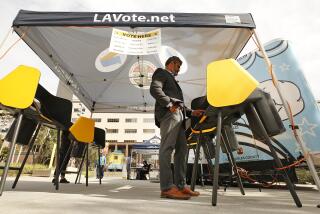El Paso’s Political Strength to Be Tested in Federal Probe
WASHINGTON — El Paso Corp.’s executives and employees have given more than $2 million to the Republican Party and President Bush in the last 2 1/2 years.
Whether they will get a return on their investment remains to be seen.
Last week, a federal regulatory judge ruled that El Paso, North America’s biggest natural-gas pipeline owner, illegally manipulated the California market during the energy crisis and drove up prices by withholding supplies, costing California more than $3 billion.
El Paso denies any wrongdoing in California and is fighting the judge’s ruling. In the meantime, the Houston-based company faces investigations of its trading practices by the Justice Department, the Securities and Exchange Commission and the Federal Energy Regulatory Commission -- agencies all headed by Bush appointees.
The company gave more than $500,000 to Bush and his party during the former Texas governor’s presidential bid in 2000, according to documents on file with the Federal Election Commission. And since Bush took office in January 2001, El Paso and its employees have contributed nearly three times that amount to the Republican Party and its candidates for the upcoming midterm elections Nov. 5. Among the recipients has been Bush’s brother in Florida and his successor in Texas.
It is a political largess that has made El Paso, with 58,000 miles of natural gas pipelines and 14,000 employees, America’s biggest oil-and-gas political donor in the election cycle that began in January 2001, according to FEC documents.
An El Paso spokesman last week said the company’s political giving is in line with its meteoric growth during the last five years but declined to elaborate on the contributions. The company said it is cooperating with the investigations.
Several industry analysts also said El Paso’s donations appear to be consistent with other large energy companies, which traditionally rank among America’s top political money givers.
*
Spending Reflects Rise
The timing of El Paso’s soaring political spending parallels not only the company’s rapid rise from a stodgy Texas pipeline company into a nationwide energy powerhouse, but also its emergence as a target of various agency probes in Washington, California and elsewhere.
Since January 2001, the company has contributed $1.4 million, the overwhelming majority of it going to the Republican National Committee, its Senate and House fund-raising subcommittees and key congressional candidates, according to FEC documents and company filings with the SEC. El Paso’s largest individual recipient during the last three years was Bush himself, FEC records show.
Those contributions came on top of large lobbying expenditures by El Paso. During the first half of this year, the company spent $290,000 lobbying Congress on a wide range of issues, according to disclosures filed with the U.S. Senate. And the company reported it spent more than $1.3 million lobbying the House and Senate last year.
*
Giving Akin to Enron’s
El Paso’s political spending is reminiscent of that of another Houston-based energy company, Enron Corp., although there are key differences.
El Paso’s political committee has overwhelmingly favored Republicans, whereas Enron gave sizable contributions to Democrats and Republicans alike. El Paso’s FEC filings also show that its campaign contributions have increased exponentially since the Bush administration took office, while Enron’s political war chest remained largely the same from year to year until it started to collapse last year.
As with Enron, most of the company’s political money has flowed through its Washington-based political action committee, or PAC, which has given more than $400,000 to the Republican Party’s national committees this year alone. But thousands of dollars more have come directly from William A. Wise, the company’s president and chief executive who also was the largest individual contributor to the company’s PAC.
Wise and the company also have contributed heavily this year to Republican candidates for state office in Florida and Texas--mainly to the Republican gubernatorial reelection campaigns in both states. In Florida, El Paso has given more than $60,000 to the Republican Party, which is trying to reelect Jeb Bush. And in Texas, Wise has given $75,000 to Gov. Rick Perry, state ethics commission records show.
President Bush has campaigned for both his brother and his successor in those races, which have generated near-record amounts of corporate and special-interest money.
But it is in Washington and Houston that El Paso’s contributions could well become a factor in the future.
*
Grand Jury Probe
In July, the company reported to shareholders that it is among the corporate targets of a federal grand jury investigation into possible illegal energy-trading practices, which it has denied.
That probe is led by the U.S. attorney’s office in Houston, a division of the Justice Department, which is headed by Atty. Gen. John Ashcroft. El Paso donated $2,000 to Ashcroft’s 2000 Senate reelection campaign in Missouri, which he lost. Bush subsequently named him America’s law-enforcement chief.
The SEC is independently investigating El Paso’s energy trading practices, as well as transactions with affiliated companies that industry analysts have said appear to be similar to those of Enron’s. The SEC is headed by a Bush appointee, Harvey L. Pitt.
And the Federal Energy Regulatory Commission is investigating El Paso’s natural-gas trading and transporting practices in California during the state’s energy crisis that could become the most dramatic backdrop for the company’s political spending.
The quasi-independent commission, part of the Energy Department, has two Republican and two Democratic commissioners. It is headed by a Republican Bush appointee, Texas energy lawyer Patrick Henry Wood III.
As Texas governor, Bush appointed Wood to head the state’s Public Utility Commission. And now, as FERC chairman, Wood has broad powers in determining how--or whether--El Paso should be punished for its business practices in California.
If El Paso is looking for favors from the Bush appointee, though, the company has yet to see them. In fact, the 40-year-old Wood took office last year pledging to put an end to the California energy crisis and thoroughly investigate its causes. He told his staff that during his tenure FERC would be “the cop on the beat” policing the energy industry. And the commission has appeared dogged in its pursuit of El Paso in the California natural-gas case.
Last week, the commission’s administrative law judge, Curtis L. Wagner Jr., stunned the company and sent its stock plummeting when he ruled that El Paso had illegally manipulated the California market by deliberately withholding an average of 345 million cubic feet of gas a day from California customers, who then were forced to pay inflated prices.
*
California Strategy
Judge Wagner’s ruling was based partly on extensive testimony last year from the company’s top executives, including Wise, that traced El Paso’s energy policies in California to a Valentine’s Day meeting in 2000 in Texas, where Wise signed off on a strategy that allegedly cost California more than $3 billion.
For his part, Wise blasted Wagner’s decision. He asserted that it was “inappropriate and without precedent to second-guess a pipeline’s day-to-day operations.” The El Paso chief added: “We are confident in the strength of our position and believe that we will ultimately obtain a favorable ruling.”
El Paso’s stock Friday closed at $8 on the New York Stock Exchange after hitting a 52-week low of $5.30 Tuesday after Wagner’s ruling. The stock has fallen 82% this year.
*
(BEGIN TEXT OF INFOBOX)
*
El Paso’s Top 10
*
Top 10 recipients of El Paso Corp’s political contributions during the last three election cycles (Jan. 30, 1997, through Aug. 31, 2002):
Republican National Committee -- $803,527
National Republican Senatorial Committee -- $252,850
National Republican Congressional Committee -- $231,269
National Republican Senatorial/Cong. Dinner Comm. -- $94,000
President Bush -- $40,134
Democratic Senatorial Campaign Committee -- $30,250
Rep. Henry Bonilla (R-Texas) -- $26,000
Sen. Don Nickles (R-Okla.) -- $25,000
Rep. Tom DeLay (R-Texas) -- $24,000
Texas State Atty. Gen. John Cornyn, Senate Candidate -- $22,000
*
Sources: Federal Election Commission filings; Dwight L. Morris & Associates’ campaign finance analysis project.
*
Times researcher Robert Patrick contributed to this report.
More to Read
Inside the business of entertainment
The Wide Shot brings you news, analysis and insights on everything from streaming wars to production — and what it all means for the future.
You may occasionally receive promotional content from the Los Angeles Times.










